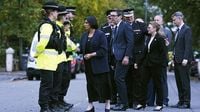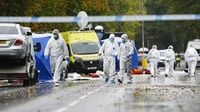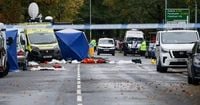In the quiet north Manchester suburb of Crumpsall, tragedy struck on October 2, 2025, when a deadly car ramming and stabbing attack unfolded outside the Heaton Park Hebrew Congregation synagogue. The assault, which occurred on Yom Kippur—the holiest day in the Jewish calendar—left two worshippers dead and three more seriously injured, sending shockwaves through Manchester’s Jewish community and the wider United Kingdom.
According to Greater Manchester Police (GMP), the violent episode began just after 9:30 a.m. local time. Witnesses reported seeing a car driven into pedestrians near the synagogue, followed by a six-minute stabbing spree. Paramedics arrived on the scene at 9:41 a.m., treating multiple victims for stab wounds and injuries from the vehicle. The police quickly declared a major incident and activated Operation Plato, the code name for a marauding terrorist attack, underscoring the gravity and urgency of the situation.
Authorities later identified the attacker as 35-year-old Jihad Al Shamie, a British citizen of Syrian heritage. He was wearing a vest that appeared to be an explosive device, but police soon confirmed it was not viable. Al Shamie was shot dead by armed officers at 9:38 a.m., just minutes after the initial emergency call. The rapid response, though decisive, would soon be scrutinized for its tragic consequences.
By 11:15 a.m., officials announced that two of the injured had died, along with the suspect. The two deceased were named as Adrian Daulby, 53, and Melvin Cravitz, 66—both members of the local Jewish community in Crumpsall. Three other victims remained hospitalized: one with a gunshot wound, one with stab injuries, and another struck by the attacker’s car.
On October 3, GMP Chief Constable Stephen Watson revealed a heartbreaking detail: “One of the deceased victims would appear to have suffered a wound consistent with a gunshot injury. It is currently believed that the suspect, Jihad Al Shamie, was not in possession of a firearm and the only shots fired were from GMP’s Authorised Firearms Officers as they worked to prevent the offender from entering the synagogue and causing further harm to our Jewish community.” Watson added, “Subject to further forensic examination, this injury may sadly have been sustained as a tragic and unforeseen consequence of the urgently required action taken by my officers to bring this vicious attack to an end.”
One of the injured survivors was also found to have suffered a gunshot wound, which, according to medical professionals, was not life-threatening. Both victims were believed to have been huddled together behind a synagogue door, bravely attempting to block the attacker’s entry. The police did not specify which of the two slain men was struck by police gunfire, pending further forensic analysis.
The significance of the attack’s timing cannot be overstated. Yom Kippur is a day of atonement and reflection, marked by prayer and fasting. Even those who rarely attend synagogue typically do so on this day, making the attack especially horrifying for the community. Manchester hosts the UK’s largest Jewish population outside London, with about 30,000 Jews, and the Heaton Park Hebrew Congregation has been a cornerstone of Jewish life in Crumpsall since 1967.
British Prime Minister Keir Starmer, upon learning of the attack, left a meeting with European leaders in Copenhagen to address the crisis. “Earlier today, on Yom Kippur, the holiest day for the Jewish community, a vile individual committed a terrorist attack that attacked Jews because they are Jews, and attacked Britain because of our values,” Starmer said, as reported by Al Jazeera. He pledged to deploy additional police to synagogues across the country, stating, “I will do everything in my power to guarantee the security every Jewish person in this country deserves.”
The response was swift and visible. Armed officers patrolled Jewish sites nationwide, and counterterrorism police declared the incident a terrorist attack by afternoon. Three additional suspects—two men in their 30s and a woman in her 60s—were arrested on suspicion of terrorism-related offenses and remain in custody as investigations continue.
The shock of the attack reverberated well beyond Manchester. Hamish Falconer, a Labour MP, expressed his dismay: “I’m horrified to hear of this incident at a synagogue I’ve been proud to visit. My thoughts are with everyone affected.” Local residents, still processing the violence, spoke of the close-knit, multicultural nature of Crumpsall. “There’s everyone here,” said Sam Martin, a 41-year-old local. “Muslims, Jews, everyone. I’ve known nothing but love and kindness from our Jewish community. I’m just shocked this could happen.”
In the aftermath, the Metropolitan Police in London urged organizers to cancel planned protests in support of the banned group Palestine Action, citing the heightened threat and the need to allocate police resources to community safety. “Yet at a time when we want to be deploying every available officer to ensure the safety of those communities, we are instead having to plan for a gathering of more than 1,000 people in Trafalgar Square on Saturday in support of a terrorist organisation,” the police said, as reported by CNN.
The attack comes amid a troubling rise in anti-Semitic incidents in the UK. The Community Security Trust, a charity focused on the welfare of British Jews, recorded 3,528 instances of anti-Semitism in 2024, the second highest annual total on record. Nineteen of those incidents involved damage to synagogues. The surge follows a global uptick in anti-Semitic and Islamophobic incidents since the outbreak of Israel’s war on Gaza in October 2023, a conflict that has intensified anxieties and divisions far beyond the Middle East.
For Manchester’s Jewish community, the events of October 2 were both a devastating blow and a stark reminder of the vulnerabilities faced by minority groups. The police have opened a public portal for concerned families and friends to seek information about loved ones who may have been at the scene, and have encouraged anyone involved to come forward with information.
As the city mourns the loss of Adrian Daulby and Melvin Cravitz, questions linger about how best to protect communities without compounding tragedy. The incident has prompted soul-searching at every level—from the officers forced to make split-second decisions, to national leaders grappling with the balance between security and civil liberties, to ordinary citizens shaken by violence in their midst. The hope is that lessons learned from this tragedy will help prevent similar horrors in the future, and that Manchester’s tradition of resilience and unity will see it through the difficult days ahead.



